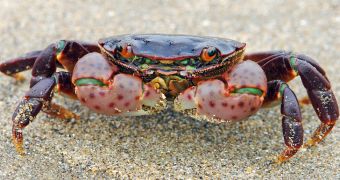A new study published in the journal Animal Behavior argues that noise pollution affects not just animals living in the deep ocean, but also creatures inhabiting shorelines.
Thus, researchers have found that the noise produced by ships disturbs shore crabs in the UK so much that it makes them stop eating.
This is because, when first exposed to noise pollution, these creatures get all worked up and start focusing more on finding places where to hide than they do on finding food.
Interestingly enough, it appears that, in time, the crabs get so used to noise pollution that they completely change their behavior, and start ignoring weird sounds altogether, Tree Hugger reports.
This marks the end of their hunger strike, but it also makes them more vulnerable to predators.
As the researchers explain, crabs that quit responding to noises they would otherwise consider a threat have higher chances of getting eaten by their natural predators.
Specialists fear that, over the years, noise pollution will foster a decrease in shore crab population both in the UK, and in other parts of the world.
“We have already found that ship noise raises the metabolic rate and energetic needs of crabs.”
“If coupled with reduced foraging and worsened responses to predators, this cocktail of impacts may negatively affect growth, fitness, survival and, ultimately, harvested populations and whole ecosystems,” Dr. Steve Simpson from the University of Exeter explains.

 14 DAY TRIAL //
14 DAY TRIAL //